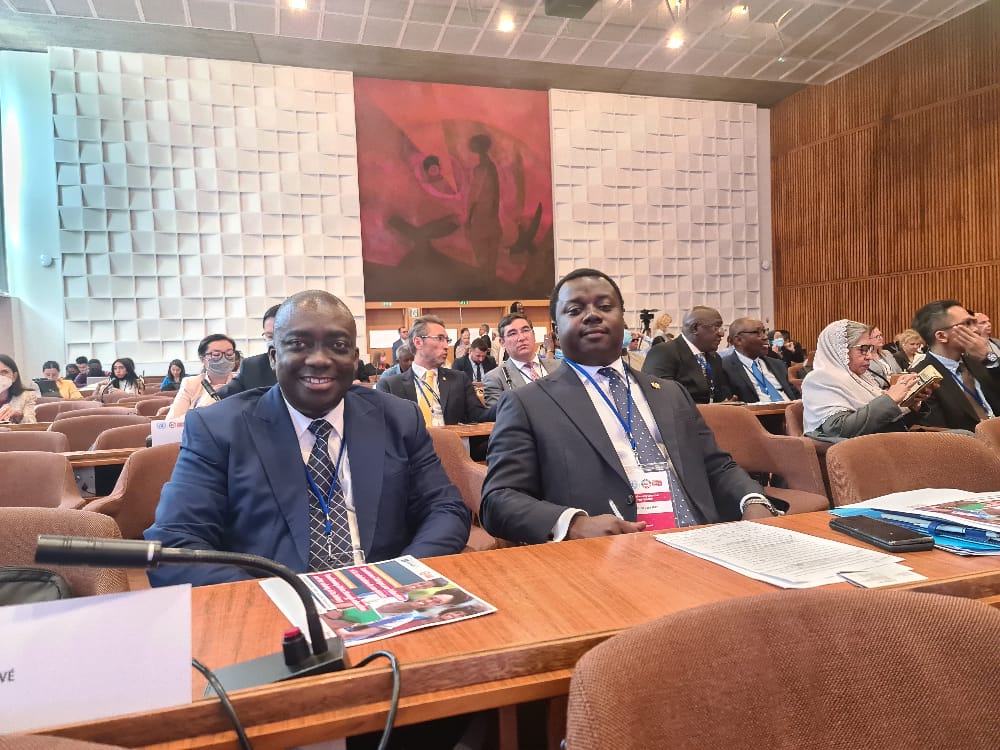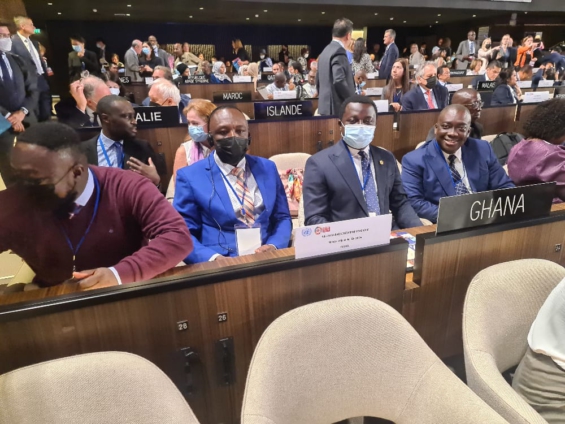Ghana has joined over 154 countries across the globe to participate in this year's Transforming Education Summit (TES), at the UNESCO headquarters in Paris.
The Transforming Education Summit (TES), an initiative of the United Nations Secretary-General, aims to “mobilize political ambition, action, solutions, and solidarity to transform education; to take stock of efforts to recover pandemic-related learning losses; to reimagine education systems for the world of today and tomorrow; and to revitalize national and global efforts to achieve SDG4.”
As part of preparations towards the Summit in September 2022 during the 77th UN General Assembly in New York City, each country was required to appoint a National Convenor to lead national multi-sectoral consultation meetings, select a thematic action track and develop a commitment statement for the President to deliver during the Summit.
President Akufo-Addo, subsequently appointed the Director-General of the Institute for Educational Planning and Administration (IEPA)—under the auspices of UNESCO, University of Cape Coast, Dr. Michael Boakye-Yiadom as the National Convenor.
The Pre-Summit in Paris, from 28th to 30th June, served as a precursor to the main Summit in September in NYC. Ghana’s delegation, led by the Deputy Minister for Education, Rev. John Ntim Fordjour, included the Ag. Chief Director of the Ministry of Education, the National Convenor, representatives of the government and the Ministry of Education, a representative of the development partners, and a youth representative. Education Ministers and Deputy-Ministers from 154 countries and nearly 2,000 participants came together at the UNESCO headquarters in Paris to discuss transforming education, inspired by the rallying call from young people.

Halfway to the deadline to meet the 2030 Sustainable Development Goal on Education, participants were certain that the world must not only get back on track but transform education from the ground up.
The Pre-Summit kicked off with a Youth Forum that brought together youth activists and representatives whose voices and ideas were key to the outcome of the Pre-Summit.
The Pre-Summit in Paris was an opportunity for UNESCO to host a gathering of Ministers of Education or their representatives, national convenors and outcomes of national consultation meetings, policymakers, the business community, and youth leaders to share ideas and work together to create a roadmap for the Transforming Education Summit (TES) in NYC in September 2022.
The Pre-Summit, which served as a precursor to the NYC TES, featured five key thematic areas of change—inclusive, equitable, safe, and healthy schools; skills and learning for life and sustainable development; teachers and teacher development; digital transformation; and financing education.
Ghana’s Minister for Education, Dr. Yaw Osei Adutwum, participated virtually as a panelist for the World Bank/Global Partnership for Education (GPE) side event which focused on country-specific initiatives to transform education.
His deputy, Rev. John Ntim Fordjour, represented him at the Ministerial Roundtable and shared Ghana’s success story, citing the free SHS, inclusive education, school feeding program, high enrollment rates, investment in infrastructure, commitment to TVET, teacher development professionalism initiatives, pre-tertiary competency-based curriculum, etc. as examples.
Addressing the conference, UNICEF Executive Director, Catherine Russel, said that “Although we have confronted a learning crisis, the epidemic has exposed us even more. 21 trillion dollars will be lost if nothing is done because of a lack of good, high quality education.
A million youngsters will be left behind if we do not invest in a learning recovery plan. For the children, we must create better mental learning mechanisms. Instead of just talking, let's work together to provide them the key.”
For the Transforming Education Summit (TES) to be successful, according to UN Secretary-General António Guterres, effective curricula and teacher capacity building are required.
“This calls for a paradigm shift, and as a team we must remember that education touches on all the SDGs."
He continued by saying that there should be a quick response because the crisis has revealed society's vulnerability.
Amina J. Mohammed, the Deputy Secretary-general of the UN, emphasized that improving education from the past would not be sufficient and that instead, it was necessary to advance education in a different way. She urged young people to unite in order to create a national movement for global change in education.
Mohammed laid out the path to the Summit: “When Heads of States come to the UN in September, we need them to speak directly to the education system they envisage for the future and to the commitments they can make now to make this happen – and to how they can ensure transformation through their efforts to drive recovery, SDG acceleration and re-imagine education for the future.”
Sahle-Work Zewde, President of Ethiopia and chair of the UNESCO International Commission on the Futures of Education, emphasized the importance of transformation as the Summit's main guiding principle and called for "strengthening public dialogue and more inclusive participation that brings in those who are often excluded."
The Pre-Summit received a statement from the Commission that the best path to sustainability and peace is via education. The door to possibilities is opened by education; the ways we learn are also the ways we lengthen our lives. She emphasized that everyone must be empowered to address this issue; it cannot be fixed by the government alone, and children cannot be denied education.
To transform education, we need programs that emphasize skills acquisition through tackling global concerns. It is important to provide teachers with opportunities for transformative learning, as well as the proper tools and working circumstances for both students and teachers”.
She continued by saying that cooperation was required because “education transcended national boards and humanitarian endeavors”.
Insisting that education is a fundamental right, President Julius Maada Bio of Sierra Leone said, "We must use this pre-summit strategically to unify all forces around the core of inclusive quality education and lifelong learning for everyone. We do this because having a good education is a right."
"This is a basic human right. We all support the idea that investing in education is an investment in the future sustainability of our society, our children, and the planet. He added that “SDG4 is a common obligation and a key tool for combating climate change. Many of us are wondering about the upcoming holidays as we sit here.
"As the pen becomes policy and the microscope finds a cure for cancer, we need more joking, dancing, empathetic, and educational activities. Instead of judging a nation's success by its policies, look at how literate its youth are. To change education, we must rethink our approach to working with institutions, have faith in the potential of young people, and recognize that we can change the world one piece at a time”.
UNESCO Director-General, Audrey Azoulay, raised the alarm on the global education crisis, pointing out that its deep roots long preceded the pandemic: “In early 2020, prior to the pandemic, 259 million children were not in school—one-sixth of the world's population in that age-group."
"And there were more than 770 million adults who could not read or write, two-thirds of whom were women, reflecting persistent inequalities. But this situation has been made worse by the pandemic.”
Azoulay called for a revolution in education—especially in response to the issues of digital transformation and climate change.
In an interview with the National Convenor, Dr. Michael Boakye-Yiadom shared that stakeholder and media engagements, national and regional consultation meetings are ongoing to help select a thematic action track that will partly inform the development of the President’s commitment statement.
He added that his support and advisory teams are working closely with the government, the Ministry of Education, development partners, youth organizations, the business community, associations of the differently-abled, representatives of labour unions and religious groups, etc. to ensure inclusivity in the ongoing national consultation meetings preceding the NYC Summit in September 2022.
Latest Stories
-
Expansion Drive: Takoradi Technical University increases faculties
4 hours -
SHS heads demand payment of outstanding funds before reopening of schools
4 hours -
We thank God for the 2024 general elections – Akufo-Addo
5 hours -
Coconut Grove Beach Resort marks 30 years of excellence with memorable 9 lessons & carols service
5 hours -
WAFU B U-17 Girls’ Cup: Black Maidens beat Nigeria on penalties to win inaugral tournament
5 hours -
Real Madrid beat Sevilla to keep pressure on leaders Atletico
7 hours -
Liverpool put six past Spurs to go four points clear
7 hours -
Manchester United lose 3-0 at home to Bournemouth yet again
7 hours -
CHAN 2024Q: ‘It’s still an open game’ – Didi on Ghana’s draw with Nigeria
7 hours -
CHAN 2024Q: Ghana’s Black Galaxies held by Nigeria in first-leg tie
8 hours -
Dr Nduom hopeful defunct GN bank will be restored under Mahama administration
8 hours -
Bridget Bonnie celebrates NDC Victory, champions hope for women and youth
8 hours -
Shamima Muslim urges youth to lead Ghana’s renewal at 18Plus4NDC anniversary
9 hours -
Akufo-Addo condemns post-election violence, blames NDC
10 hours -
DAMC, Free Food Company, to distribute 10,000 packs of food to street kids
11 hours

